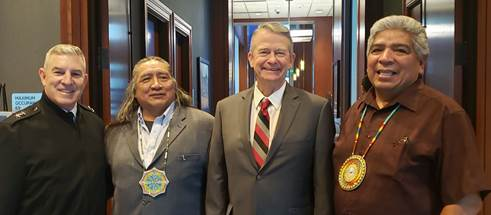
- Details
- By Native News Online Staff
BOISE, Idaho — The Shoshone-Bannock Tribes hosted a legislative reception on Jan. 29 in Boise to share the Tribe’s priorities for 2020 with Idaho lawmakers, state officials and Governor Brad Little.
Tribal officials provided an update on the Tribe’s 2020 Census efforts, tribal economic development, education, tax, and energy initiatives.
Other information presented included the need for the development of a State Task Force on Missing and Murdered Indigenous People (MMIP) in Idaho, support for Idaho’s efforts to legalize hemp, and support for a proposed Tribal Cultural Center in Boise.
More than 60 people attended the event, including Shoshone-Bannock Tribes citizen Dr. LaNada War Jack, who released a book late last year.
The following day, Shoshone-Bannock Tribes Chairman Edmo and Councilmember Lee Juan Tyler and staff attended an official meeting with Governor Little at the Statehouse. The Tribes and the Governor are working together to develop an executive order process for PL 280 retrocession. The Governor’s Intergovernmental Director, Ms. Bobbi-Jo Muelman, was tasked to continue to work with the Tribes and other stakeholders to gain support for this executive order process. Other issues addressed during the meeting was in accordance with the Governor’s education priorities, whereas, the Tribes requested the Governor to focus and work cooperatively on Indian education issues.
The Tribes also requested the need to increase tribal representation on State boards and commissions, and the Governor encouraged all qualified tribal members to apply for any open positions by checking on the state of Idaho website.
More Stories Like This
Native News Weekly (August 25, 2024): D.C. BriefsCheyenne River Youth Project to Celebrate Women’s Strength at Barbie-Themed Passion for Fashion on March 14
Celebrating Native American Women
Native Bidaské: The Illusion of Freedom and the Myth of America 250, Leonard Peltier Speaks Out
Monday Morning (March 2, 2026): Articles You May Have Missed This Past Weekend
Help us defend tribal sovereignty.
At Native News Online, our mission is rooted in telling the stories that strengthen sovereignty and uplift Indigenous voices — not just at year’s end, but every single day.
Because of your generosity last year, we were able to keep our reporters on the ground in tribal communities, at national gatherings and in the halls of Congress — covering the issues that matter most to Indian Country: sovereignty, culture, education, health and economic opportunity.
That support sustained us through a tough year in 2025. Now, as we look to the year ahead, we need your help right now to ensure warrior journalism remains strong — reporting that defends tribal sovereignty, amplifies Native truth, and holds power accountable.
 The stakes couldn't be higher. Your support keeps Native voices heard, Native stories told and Native sovereignty defended.
The stakes couldn't be higher. Your support keeps Native voices heard, Native stories told and Native sovereignty defended.
Stand with Warrior Journalism today.
Levi Rickert (Potawatomi), Editor & Publisher

